In today’s fast-paced, tech-driven world, the MBA degree online is no longer just an alternative — it’s a smart, strategic move for thousands of working professionals and fresh graduates alike. As we step deeper into 2025, online MBA programs have evolved into robust, flexible, and industry-aligned offerings that rival their on-campus counterparts. But with so many choices and big promises, the question still stands: Is an online MBA degree truly worth it in 2025?
In this blog, we’ll break down everything — from how these programs work, to how they’ve transformed over the years, and whether they genuinely offer value in terms of career growth, ROI, and relevance in today’s competitive job market.
Current Landscape of Online MBAs in 2025
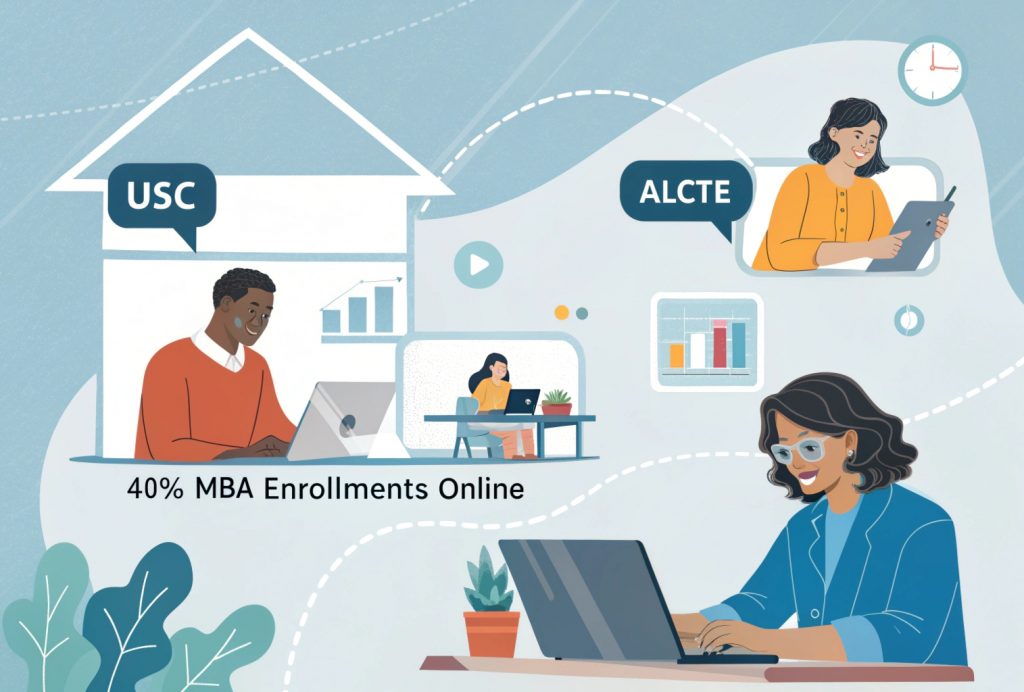
In 2025, online MBA programs have moved far beyond being just a “backup option.” Today, they’re a mainstream, respected, and smart choice for professionals looking to level up their careers without hitting pause on their jobs. And the stats prove it — nearly 4 out of every 10 MBA enrollments in India are now in online or hybrid formats.
Why the sudden growth? Because the modern workforce wants flexibility without compromising on quality. Online MBAs offer just that — the ability to learn from anywhere, at your own pace, while still getting access to top-notch faculty, real-world projects, and corporate-ready skills.
These programs are no longer limited to recorded lectures. Many now feature live classes, interactive sessions, personal mentorship, and placement support — making them just as rigorous and engaging as traditional MBAs.
And yes, these degrees are completely valid and recognized. Thanks to clear guidelines from UGC and AICTE, online MBA degrees from approved universities in 2025 carry the same legal and professional value as traditional ones. As long as the program is from a UGC-entitled institution, you’re getting a degree that holds real weight in the job market.
In short, the online MBA isn’t just catching up anymore — it’s setting the pace.
Comparing Online MBA vs Traditional MBA
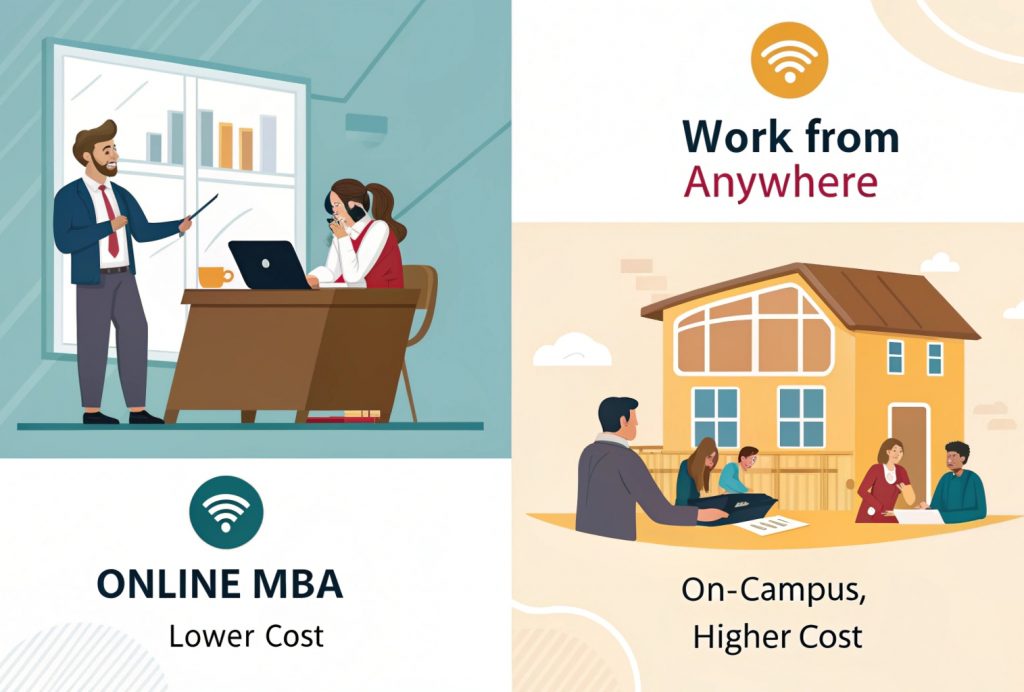
Choosing between an online MBA and a traditional, on-campus program is an important decision — and one that depends largely on your lifestyle, career goals, and learning preferences. While both formats can offer strong academic foundations and career outcomes, they differ significantly in terms of structure, cost, and experience.
Here’s how the two compare:
Flexibility and Accessibility
- Online MBA: Offers the freedom to learn from anywhere, anytime — ideal for working professionals or individuals with family or location constraints.
- Traditional MBA: Requires full-time, on-campus attendance, which may involve relocation or a break from employment.
Curriculum and Learning Experience
- Online MBA: Delivered through a mix of live sessions, recorded lectures, digital tools, and self-paced modules. Often includes real-world projects and industry-relevant case studies.
- Traditional MBA: Provides a more structured schedule with classroom interactions, in-person discussions, and access to on-campus facilities.
Networking and Peer Interaction
- Online MBA: Virtual networking through webinars, discussion boards, and group projects. Interaction can be limited but still meaningful.
- Traditional MBA: Offers in-person networking, alumni meets, and deeper peer connections through classroom and campus engagement.
Cost and ROI
- Online MBA: Typically more affordable. No accommodation or travel expenses, and you can continue working while studying.
- Traditional MBA: Higher tuition and living costs, along with potential income loss due to full-time study.
An online MBA is a practical, cost-effective option for those seeking flexibility and continued employment, while a traditional MBA suits those who can commit full-time and prefer an immersive, on-campus experience. Both can open doors — the right choice depends on your personal and professional priorities.
Career Prospects After an MBA Degree Online

Gone are the days when employers doubted online degrees. In 2025, companies care more about skills, adaptability, and outcomes — not whether you earned your MBA in a classroom or through a screen. In fact, many recruiters now see an MBA degree online as a sign of someone who’s proactive, self-driven, and tech-savvy — all valuable traits in the modern workplace.
Online MBA graduates are finding success across industries and roles, especially in areas that value business strategy, digital skills, and remote collaboration. Here’s a quick look at where these grads are heading:
Popular Roles and Industries Hiring Online MBA Graduates
- Business Analyst, Project Manager, and Operations Lead in tech startups and MNCs
- Marketing Manager, Brand Strategist, and SEO/Performance Marketers in digital agencies
- Finance Manager, Investment Analyst, and FinTech Product Owners in BFSI
- HR Business Partner and Talent Acquisition Lead in global HR firms
- Product Manager and Customer Success roles in SaaS and e-commerce companies
Placement Trends in 2025
- Employers are actively participating in online placement drives and virtual hiring events.
- Many online MBA programs offer dedicated career cells and 1-on-1 placement support.
- Skill-based hiring has overtaken degree-based filtering — portfolios and performance matter more.
Real Success Stories
- A software engineer from Pune transitioned into product management at a top SaaS firm after completing an online MBA in Strategic Leadership.
- A digital marketing freelancer in Delhi scaled her career into a full-time Brand Manager role at an e-commerce giant.
- A former BPO team lead from Hyderabad moved into an HR generalist position at an MNC after completing a specialized online MBA in HR.
The career doors that open after an online MBA are just as wide — and sometimes even more flexible — than those opened by traditional routes. It’s all about how you use the degree to stand out.
Explore our online programs to become future-ready
Transform your career with industry-aligned courses designed by experts.
Online MBA Specializations in Demand
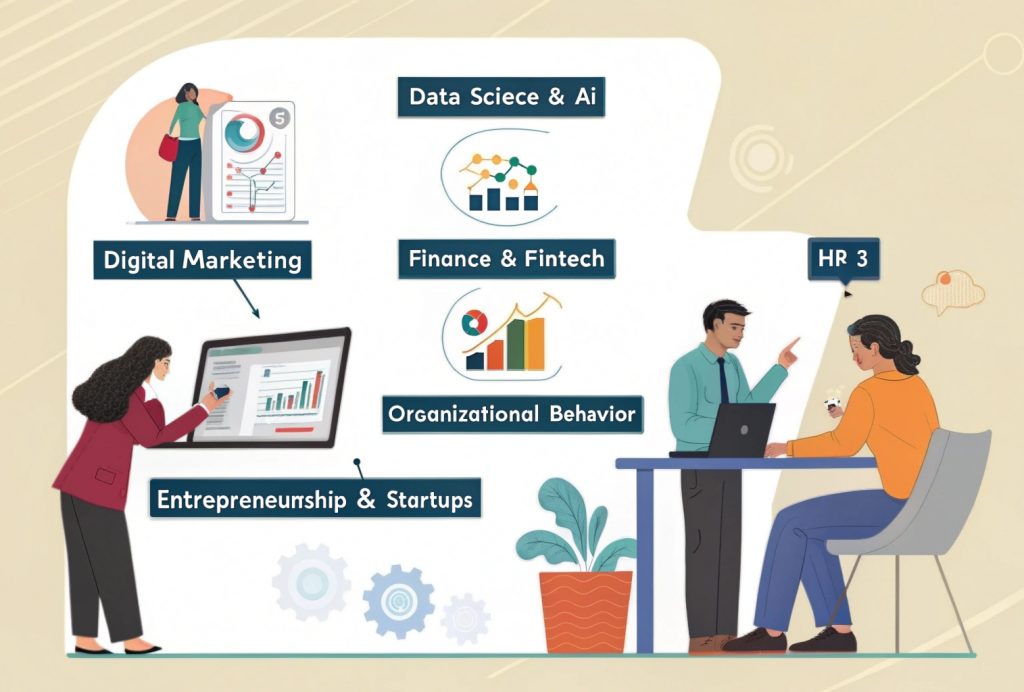
In 2025, just having an MBA isn’t enough — it’s about having the right specialization that matches your career goals and industry needs. That’s where online MBAs shine. They offer in-demand, career-focused specializations that go beyond the basics and prepare you for the real-world challenges of your chosen field.
Here are some of the most sought-after online MBA specializations today:
Data Science & AI
- Perfect for professionals who want to blend business acumen with tech.
- Prepares you for roles like Business Intelligence Analyst, AI Product Manager, or Data Strategy Consultant.
Digital Marketing
- Ideal for those eyeing roles in brand strategy, performance marketing, SEO, or social media.
- Covers tools like Google Ads, Meta Business Suite, Analytics, and automation platforms.
Finance & FinTech
- For careers in investment banking, corporate finance, or the rapidly growing fintech sector.
- Includes modules on blockchain, digital payments, and financial data analysis.
HR & Organizational Behavior
- Great for aspiring HR leaders, recruiters, or culture strategists.
- Focuses on talent management, employee engagement, L&D, and HR analytics.
Entrepreneurship & Startups
- Tailored for innovators, founders, and those working in early-stage ventures.
- Covers fundraising, product-market fit, scaling strategies, and lean startup principles.
Each of these specializations gives you not just knowledge, but job-ready skills tailored to what employers are actively looking for today. Choosing the right one can significantly boost your career direction and open new doors — whether you’re switching roles or moving up the ladder.
Return on Investment (ROI) of an Online MBA
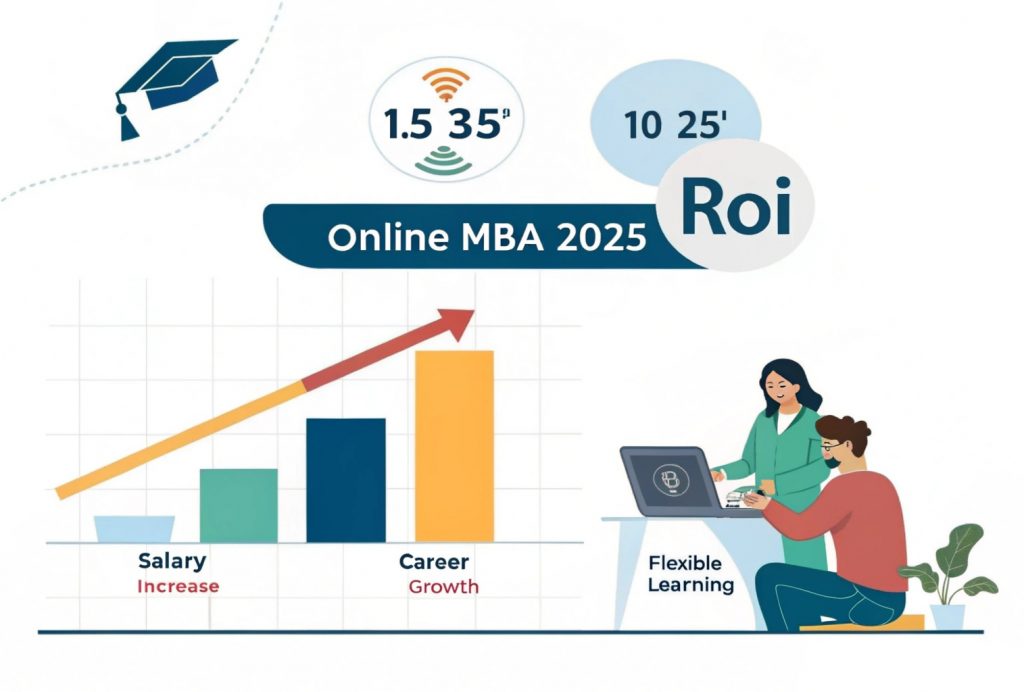
Let’s be real — one of the biggest questions people ask before enrolling in any MBA program is: “Will it be worth it?” When it comes to an online MBA, the answer in 2025 is increasingly leaning toward yes — especially when you compare the cost, flexibility, and career outcomes it offers.
Here’s how the return on investment actually plays out:
Cost of Tuition vs Salary Growth
- Online MBAs typically cost ₹1.5 to ₹3.5 lakhs, compared to ₹10–25 lakhs for traditional MBAs.
- Graduates often see a salary bump of 40% to 100% within 1–2 years of completing the program.
- Many professionals recover the cost of the degree within the first year of switching roles or promotions.
Time Commitment vs Career Acceleration
- Programs can be completed in 12–24 months, with flexible schedules.
- You can continue working while studying, so there’s no loss of income.
- Skill-based learning means you can apply what you learn immediately at work — leading to faster recognition and opportunities.
Case Studies: ROI from Leading Online MBA Programs
- A mid-level sales manager saw a 70% salary increase after completing an online MBA in Marketing and moving into a digital strategy role.
- A tech consultant used an MBA in AI & Analytics to shift into a high-paying product role in a US-based startup, doubling their compensation.
- An HR associate with 4 years’ experience transitioned into an HRBP role post-MBA, with a 60% hike in pay and responsibilities.
The ROI of an online MBA in 2025 is not just financial — it’s also about career growth, upskilling, and unlocking new paths without the heavy debt or downtime of a traditional program. For the right candidate, it’s one of the smartest investments you can make today.
Who Should Consider an MBA Degree Online?

An online MBA isn’t a one-size-fits-all solution — but for the right kind of learner, it can be a total game-changer. If you’re someone who wants to grow in your career without taking a break from work, or you’re planning a shift into a new field altogether, an MBA degree online might be exactly what you need. It’s flexible, affordable, and designed for real-life challenges.
Here’s who benefits the most from an online MBA in 2025:
Working Professionals & Entrepreneurs
- Want to upskill while continuing to work full-time.
- Prefer applying what they learn in real time to their business or job.
- Don’t want to pause their income or relocate for a full-time program.
Career Switchers
- Looking to move into fields like marketing, product management, data analytics, HR, or finance.
- Need a solid academic and practical foundation without starting from scratch.
- Benefit from specialization options that align with their new career path.
International Students & Remote Learners
- Students based outside India looking for a cost-effective, UGC-recognized Indian MBA.
- Professionals in Tier 2 or remote cities who want access to top-quality faculty and industry exposure.
- Learners who need flexibility due to time zones, family commitments, or personal reasons.
In short, an online MBA is perfect for those who value flexibility, career advancement, and skill-building without the traditional classroom limitations. If you’re someone who learns independently, wants to grow fast, and prefers a career-first approach — this path is built for you.
Accreditation, Rankings & Quality Assurance
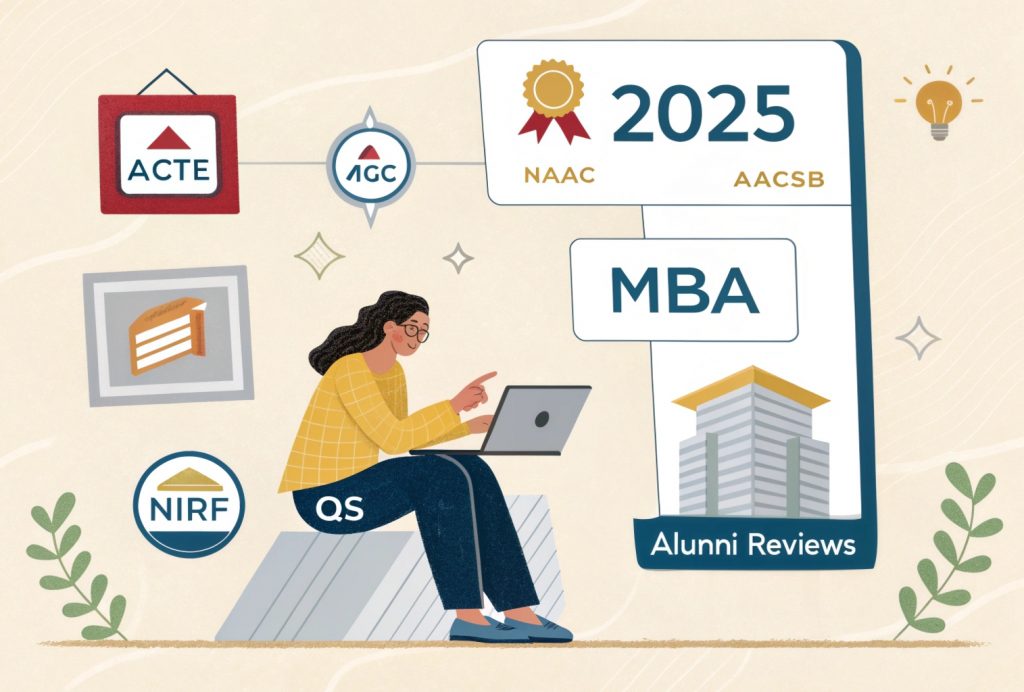
Let’s face it — not all online MBA programs are created equal. In 2025, the credibility of your degree matters just as much as the knowledge you gain. That’s why understanding accreditation, rankings, and overall program quality is so important before you commit to any online MBA.
Here’s what you need to look for to make sure you’re getting a legit, career-worthy education:
Importance of Accreditation (AACSB, NAAC, AICTE)
- AICTE (All India Council for Technical Education): Approves technical programs in India, including MBA. Always check for AICTE approval.
- UGC & NAAC: UGC entitlement ensures the university can offer online degrees, and NAAC accreditation reflects overall institutional quality.
- AACSB or EQUIS (for global programs): These are international accreditations that signal high academic standards, especially useful if you’re planning to work abroad.
How to Verify a Credible Online MBA Program
- Check the official website for UGC entitlement or AICTE approval letters.
- Look up the NAAC grade — A and above is considered strong.
- Explore rankings from trusted sources like NIRF, QS, or global education portals.
- Read student reviews and alumni success stories to get real-world feedback.
- Avoid flashy programs that don’t clearly mention accreditation or offer vague placement promises.
A credible online MBA should be transparent, accredited, and backed by solid outcomes. Do your homework before enrolling — because the right degree can open doors, but the wrong one might just waste your time and money.
Technological Advancements in Online Learning (2025)

Online MBA programs in 2025 are more than just video lectures and PDFs. Thanks to major tech upgrades, today’s online learning experience feels smarter, more interactive, and a lot more personal. Whether it’s AI-driven recommendations or immersive simulations, the way students learn business online has gone through a serious glow-up.
Here’s how technology is reshaping online MBA education:
Use of AI, AR/VR, and Simulations in MBA Courses
- AI tools now personalize your learning path — suggesting what to focus on next based on your strengths and weaknesses.
- Simulations and case-study environments allow students to solve real-world business problems in a virtual setup.
- Some programs are even using AR/VR to create immersive classroom-like experiences, especially in subjects like operations, leadership, and marketing.
Learning Platforms and LMS Tools
- Modern MBA programs run on intuitive Learning Management Systems (LMS) that make navigation, scheduling, and tracking progress super easy.
- Platforms like Moodle, Blackboard, and custom-built portals offer discussion forums, assignment tracking, live classes, and feedback — all in one place.
- Many programs now integrate with tools like Zoom, Slack, and Microsoft Teams for seamless communication and collaboration.
Student Engagement in a Virtual Environment
- Interactive quizzes, breakout rooms, polls, and group projects keep students actively engaged.
- Gamification elements like badges, leaderboards, and weekly challenges motivate consistent participation.
- Virtual office hours, peer-to-peer chat rooms, and mentorship sessions create a strong sense of community — even without a physical campus.
Online MBA programs today are tech-driven, user-friendly, and built for real engagement — making the learning process both efficient and enjoyable.
Challenges of Pursuing an MBA Degree Online

While online MBAs come with a lot of benefits — flexibility, affordability, and accessibility — they’re not without their challenges. It’s important to know what you’re signing up for so you can prepare ahead and make the most of the experience. The good news? Most of these challenges can be tackled with the right mindset and a bit of planning.
Here are a few common hurdles students face during their online MBA journey:
Time Management & Self-Discipline
- With no fixed class schedule or campus routine, it’s easy to procrastinate.
- You’ll need to set your own deadlines, create a study schedule, and stick to it — especially if you’re balancing work and study.
- Distractions at home can affect consistency, so setting boundaries is key.
Limited Face-to-Face Mentorship
- Unlike traditional MBAs, you don’t get regular in-person access to professors or peers.
- While many programs offer virtual mentorship, it can still feel a bit distant at times.
- Building strong relationships online requires extra effort through forums, live sessions, or reaching out for feedback.
Perceived Value Among Employers
- Although perceptions are changing fast, some employers may still view online MBAs as “less intense.”
- This makes it even more important to choose a well-accredited program and showcase your learning and outcomes clearly.
- Practical experience, certifications, and project work can help boost credibility.
Yes, there are challenges — but they’re manageable with the right approach. If you’re motivated, organized, and proactive, an online MBA can be just as rewarding (and respected) as a traditional one.
Tips for Choosing the Right Online MBA Program
With so many online MBA programs available in 2025, choosing the right one can feel overwhelming. But don’t worry — it’s not about picking the most expensive or the most hyped option. It’s about finding a program that aligns with your goals, your schedule, and your career path. Doing a bit of homework upfront can save you a lot of time (and regret) later.
Here are a few key things to keep in mind when making your choice:
Factors to Evaluate: Curriculum, Faculty, Placement
- Look for programs with an updated, industry-relevant curriculum — especially if you’re targeting a specific specialization.
- Check the faculty profiles — do they have real-world experience or just academic backgrounds?
- See if the program offers placement support, career guidance, or industry projects — these can make a huge difference post-MBA.
Reviews & Alumni Feedback
- Go beyond brochures — check student reviews on LinkedIn, YouTube, or Quora.
- Try to connect with alumni on LinkedIn and ask about their experience, career outcomes, and overall satisfaction.
- Genuine feedback will give you a clearer picture than any marketing material.
Red Flags to Avoid
- Be cautious of programs that are vague about accreditation or UGC/AICTE approvals.
- Avoid institutes that guarantee jobs or placements without explaining how.
- If a website lacks transparency about fees, syllabus, or faculty, consider it a warning sign.
Choosing the right online MBA is all about finding a program that’s credible, student-focused, and aligned with your long-term goals. Don’t rush it — take your time and trust your research.
Conclusion
So, is an online MBA degree worth it in 2025? For many, the answer is a clear yes — but only if you choose the right program and go in with the right expectations. Online MBAs today are flexible, affordable, and designed for real-world success. They offer the chance to upskill, switch careers, or climb the ladder — all without putting your current life on hold.
From high-demand specializations and modern learning tools to recognized accreditations and career opportunities, online MBA programs have come a long way. But like any investment, it only pays off when you do your part — research well, stay committed, and apply your learning.
Whether you’re a working professional, a career switcher, or someone who simply values learning on your own terms, an online MBA in 2025 can be a powerful step toward your future.


Leave a Reply